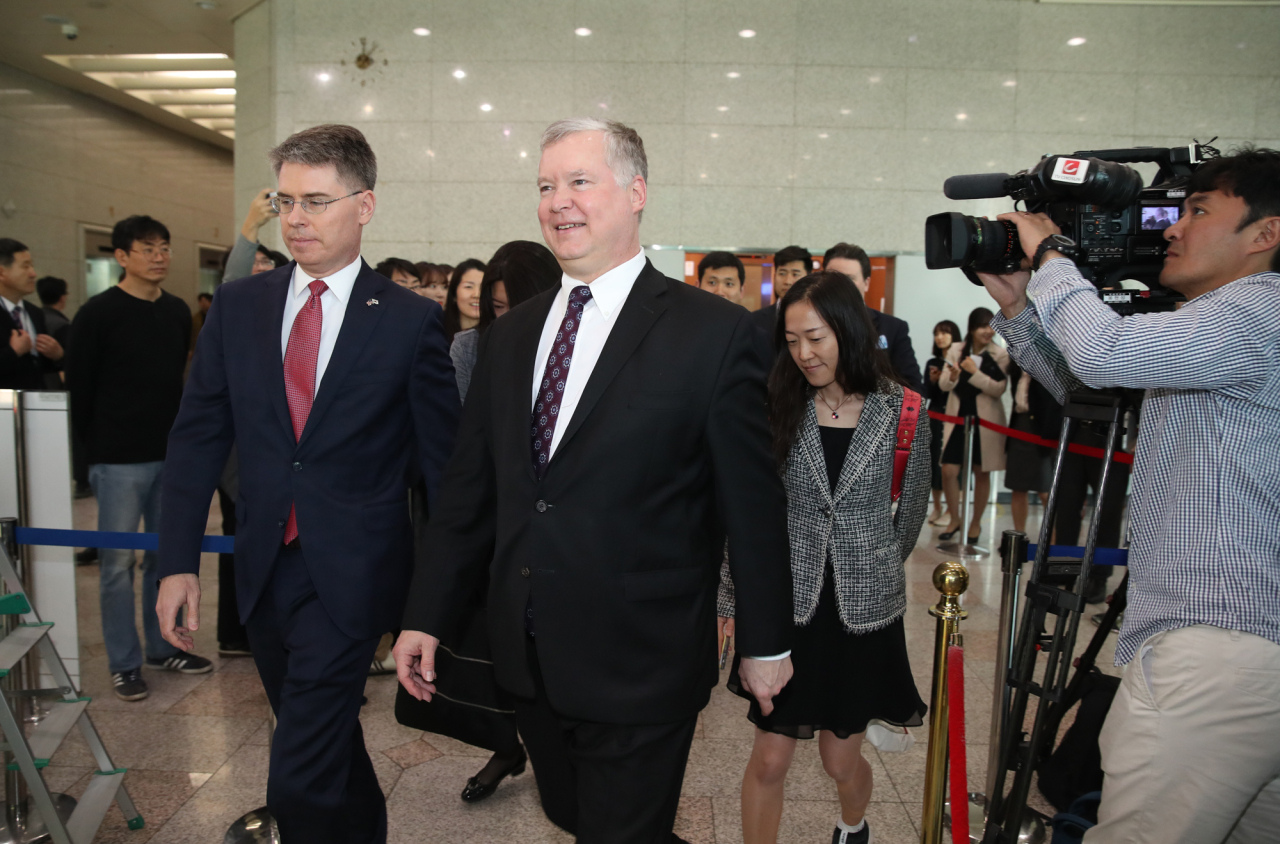US special envoy for North Korea Stephen Biegun was quoted as saying Friday that the door remains open for North Korea to return to nuclear negotiations, despite Pyongyang's firing of two missiles the previous day.
Biegun made the remarks during his courtesy call on South Korean Foreign Minister Kang Kyung-wha amid fears that the North's escalatory moves could derail the allies' ongoing efforts to bring a lasting peace to the divided peninsula.
Just five days after firing off multiple projectiles, the North launched the short-range missiles on Thursday, putting a damper on Seoul's moves to provide food aid to Pyongyang as a potential catalyst for the resumption of nuclear negotiations between the United States and the North.
 |
(Yonhap) |
"While assessing (the current point) as a very crucial juncture to continue communication and cooperation between the South and the United States, Representative Biegun said that the door for North Korea's return to negotiations remains open," the ministry said in a press release.
The negotiations between Washington and Pyongyang have hit an impasse since the second summit between US President Donald Trump and North Korean leader Kim Jong-un collapsed due to a failure to bridge gaps on the extent of Pyongyang's denuclearization and Washington's sanctions relief.
Kang voiced concerns that the North's launches on Thursday would not be helpful at all for efforts to improve inter-Korean ties and reduce military tension.
"(Kang) stressed that it is important to have serious dialogue among the South, North and US for the complete denuclearization (of the peninsula) and the establishment of a lasting peace," the ministry said.
At the start of his meeting with Kang, Biegun with a smile told Kang, "Nice to be back."
The smile belied the undercurrents of tensions caused by the North's latest launches.
In an apparent sign of the US' caution in its public messaging, the plan to allow the press to cover Biegun's opening remarks during the courtesy call was canceled.
He also called off a brief press availability that he had planned to hold following the working group session, a diplomatic source here said.
Following the courtesy call, Biegun and his counterpart, Lee Do-hoon, presided over a meeting of the joint "working group" aimed at coordinating the allies' approaches on the North's denuclearization, humanitarian aid, sanctions enforcement and inter-Korean relations.
Aside from the foreign ministry staff, Seoul officials from the defense and unification ministries and the presidential office Cheong Wa Dae attended the working group meeting.
The US side included Alex Wong, US deputy assistant secretary of state for North Korea, and Allison Hooker, director for Korea on the White House National Security Council.
The North's escalatory military moves apparently topped the working group agenda as both South Korean President Moon Jae-in and Trump have expressed concerns over them.
During a KBS interview on Thursday, Moon warned that Pyongyang's such moves would make the negotiation phase harder.
Trump said the US is monitoring the North "very seriously" after its launch of the projectiles, adding he doesn't think the regime is ready to negotiate.
The working group meeting had been expected to focus on humanitarian aid as Seoul has pushed for it to persuade Pyongyang to return to dialogue at a time of spring poverty in the North hit by severe food shortages.
According to the U.N. Food and Agriculture Organization and the World Food Program, the North produced 4.9 million tons of crops last year, the lowest amount in a decade, and needs 1.36 million tons of food aid from outside.
It remains to be seen if the allies can move forward their discussions on food aid amid lingering criticism about such assistance in the wake of its military moves.
While saying that the US support for food aid came before Thursday's launches, Moon noted the need for public understanding and consensus, and discussions among the ruling and opposition parties before the aid materializes.
Later in the day, Biegun plans to meet Unification Minister Kim Yeon-chul.
He is also expected to meet Chung Eui-yong, head of the presidential National Security Office, or its deputy chief Kim Hyun-chong.
Biegun is set to leave Seoul on Saturday following a four-day visit. (Yonhap)








